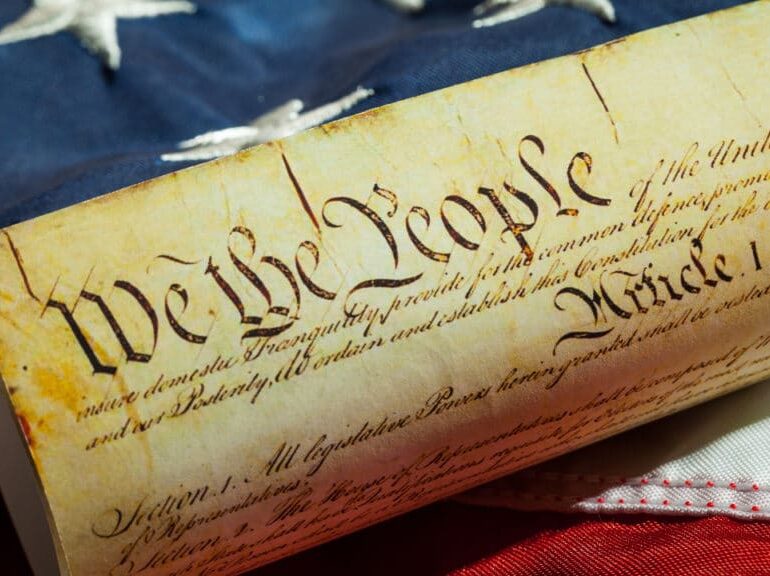
The Constitution: A Fixed Point of Reference
By: Mike Maharrey
Land surveying depends on fixed reference points.
In the U.S., you will often find these points marked by cast metal disks embedded in rock, or placed on concrete pillars or pipes driven into the ground. They are intended to be permanent. Disturbing survey marks is generally illegal. Today, reference points can also be established by geolocation using GPS.
Using these known points, surveyors can accurately establish the location of other points, draw map boundaries, and delineate borders between states, counties, public lands, and private property. Without these fixed reference points, accurate surveying becomes virtually impossible.
Written constitutions serve a similar purpose in a political system.
Thomas Jefferson emphasized the importance of having a written constitution as a political reference point in an 1802 letter to Joseph Priestly.
Jefferson referenced the Alien and Sedition Acts, saying that their enactment “made it doubtful how far even [the Bill of Rights] were of any value.” He called these acts “gross violations” of the Constitution. But Jefferson emphasized that the failure of the Constitution to stop Congress from passing and John Adams from enacting the Alien and Sedition Acts didn’t render the Constitution useless.
“However it is still certain that tho’ written constitutions may be violated in moments of passion or delusion, yet they furnish a text to which those who are watchful may again rally & recall the people: they fix too for the people principles for their political creed.”
A written constitution with a fixed meaning serves as a political reference point.
James Madison called constitutions “parchment barriers” and correctly argued that they don’t stop the government from acting outside of its limits. But they do establish a standard. We know when the government oversteps its bounds because the Constitution clearly delineates those bounds in black and white. As Jefferson put it, the Constitution serves to “fix” the principles.
And when we know where the limits lie, “those who are watchful” can take steps to enforce them.
This is why a “living breathing” constitution is useless.
In effect, it creates a government with unlimited power. If fixed points of reference don’t exist, it becomes impossible to even know when the government has grasped too much power, much less take steps to stop it. This is why big government advocates of every persuasion love the idea of a living breathing Constitution. They can always prove a given government action is legitimate by redefining words and getting some court to go along. Living breathing interpretations remove all of the fixed points of reference and leave you with — nothing.
This is exactly how we’ve ended up with the biggest, most powerful government in the history of the world.
This was entirely predictable. James Madison warned that if the Constitution was subject to change by simply redefining words, the United States could not have a “stable” system of government.
“I entirely concur in the propriety of resorting to the sense in which the Constitution was accepted and ratified by the nation. In that sense alone it is the legitimate Constitution. And if that be not the guide in expounding it, there can be no security for a consistent and stable, more than for a faithful exercise of its powers. If the meaning of the text be sought in the changeable meaning of the words composing it, it is evident that the shape and attributes of the Government must partake of the changes to which the words and phrases of all living languages are constantly subject. What a metamorphosis would be produced in the code of law if all its ancient phraseology were to be taken in its modern sense!” [Emphasis added]
If you tear up the survey marks, it becomes difficult, if not impossible to survey. You end up with wonky maps. If you tear up the limits written into the Constitution, it becomes difficult, if not impossible to maintain a “consistent and stable” government. You end up with the biggest, most powerful government in the history of the world.